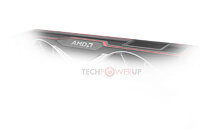Wednesday, March 25th 2020

AMD Reports Theft of Graphics IP, Stolen Information Not Core to Competitiveness
AMD today disclosed that in December 2019, it was contacted by a person in possession of test files related to development of future graphics products, some of which were posted online and later taken down. This person has additional files that were never posted online, but the company maintains the data breach won't affect the competitiveness or security of its upcoming graphics processors. The company said that it is working closely with law enforcement as part of a criminal investigation into the incident.
The statement by AMD follows:
The Torrent Freak report also includes a conversation with the person. "In November 2019, I found AMD Navi GPU hardware source codes in a hacked computer. The user didn't take any effective action against the leak of the codes," she states. "The source code was unexpectedly achieved from an unprotected computer//server through some exploits. I later found out about the files inside it. They weren't even protected properly or even encrypted with anything which is just sad." The leaker values the information at around $100 million, and is willing to sell it to the highest bidder. "If I get no buyer I will just leak everything," she told Torrent Freak.
Sources:
AMD, Torrent Freak
The statement by AMD follows:
At AMD, data security and the protection of our intellectual property are a priority. In December 2019, we were contacted by someone who claimed to have test files related to a subset of our current and future graphics products, some of which were recently posted online, but have since been taken down. While we are aware the perpetrator has additional files that have not been made public, we believe the stolen graphics IP is not core to the competitiveness or security of our graphics products. We are not aware of the perpetrator possessing any other AMD IP. We are working closely with law enforcement officials and other experts as a part of an ongoing criminal investigation.According to a Torrent Freak report, AMD used the Digital Millennium Copyright Act (DMCA) to take down the leaked information. The person behind the data breach posted the it (mostly source code related to drivers or firmware), onto a GitHub repository by the handle "xxXsoullessXxx," and titled "AMD-navi-GPU-HARDWARE-SOURCE." The repo contains code that points to "Navi 10," "Navi 21," and "Arden," possibly an internal codename for the GPU of Xbox Series X. Following the DMCA complaint, GitHub's admins promptly scrubbed the repo.
The Torrent Freak report also includes a conversation with the person. "In November 2019, I found AMD Navi GPU hardware source codes in a hacked computer. The user didn't take any effective action against the leak of the codes," she states. "The source code was unexpectedly achieved from an unprotected computer//server through some exploits. I later found out about the files inside it. They weren't even protected properly or even encrypted with anything which is just sad." The leaker values the information at around $100 million, and is willing to sell it to the highest bidder. "If I get no buyer I will just leak everything," she told Torrent Freak.

36 Comments on AMD Reports Theft of Graphics IP, Stolen Information Not Core to Competitiveness
possession is 9/10 of the law they say.........
*Death Island - where I put all my 'disagreeables'**.
**Disagreeables - those who are anathema to the welfare of humanity***.
***Anyone who doesn't like Calvin & Hobbes.
I also made a C&H christmas card for my (now) wife when we were pen-pals. About 30 years ago.
Edit: she just told me she still has it. :love:
But on-topic, bad hackers!
Anyway, no one is going to buy stolen IP, so they might as well leak it!
Just because a door to a house is unlocked doesn't mean you're allowed to enter and do whatever the hell you want, and taking anything without permission is theft.
It's painful to watch.
Latest "rumours" from a site-which-shouldn't-be-even-mentioned say October 2020 release for both Navi 2* and Zen 3-based Vermeer.
github.com/xxXsoullessXxxIt's a felony charge i believe.
One best case scenario is ray traced near versus rasterized far end. Rays are gpu scalable which is always good for business.That was what I was against. Walls aren't high res when you render more, it is about the sample distribution. It has to follow detail curve analogously which ray tracing does natively.
In rasterization, you render in a similar pattern, however, since weight is on reads it curbs performance. It has to have equal weights to r:w for optimal scalability. Ray tracing has that. Rasterized graphics have a low cutoff point. Think of it as 512x rays versus 512x aa sampling.